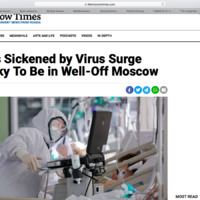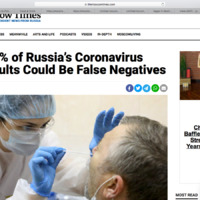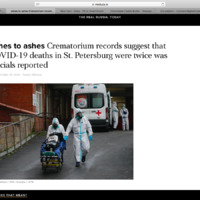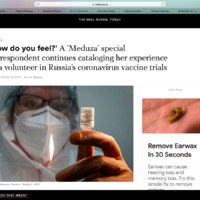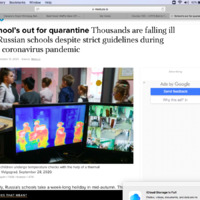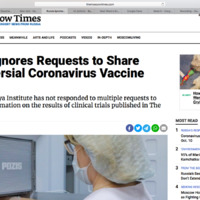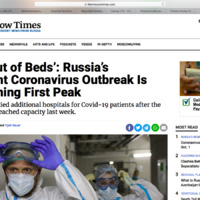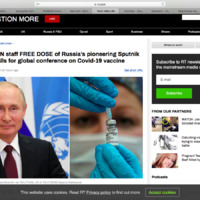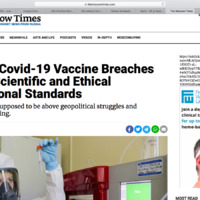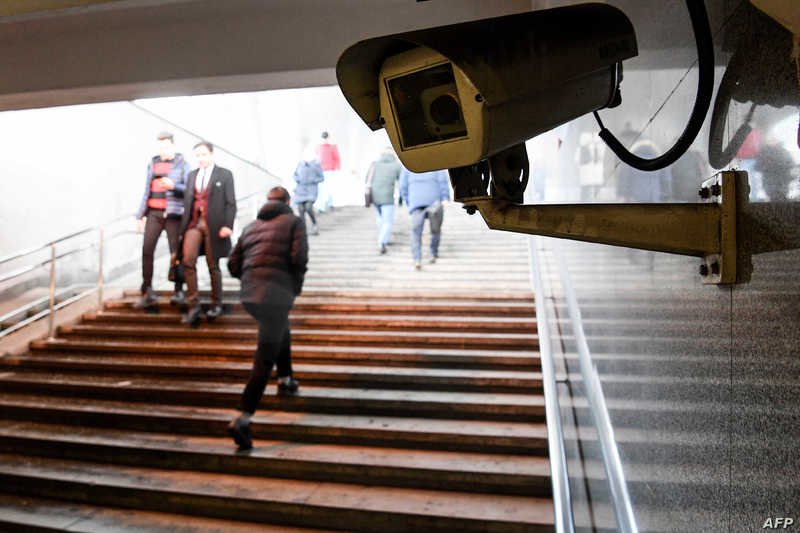RUSS 005 - Omega Project - Jinny Yoon
News Articles
Introduction
Like many other nations worldwide facing the COVID-19 pandemic, Russia has imposed measures such as mask-wearing, closing public facilities, and lockdown to curb the virus's spread. Furthermore, Russia is determined to lead the way in developing a vaccine that will be distributed worldwide. However, Russia currently has the highest number of confirmed cases in Europe, with 2,460,770 confirmed cases as of December 6, 2020, and one critical factor of this alarming rate is Russia's disregard for both ethics and physical health in addressing the pandemic. This exhibit will delve deeper into the state's violation of moral and physical hygiene throughout the coronavirusand its effects on Russian society.
The "Vaccine Race"
Russia's attitude towards vaccine development portrays how Russia has adopted an "us versus them" attitude in what the nation perceives to be a "vaccine race," rather than a collective effort to achieve health and safety for all. By naming Russia's first vaccine "Sputnik V" and claiming that Russia has "won the vaccine race," the state approaches the pandemic with an overly nationalistic mindset that treats the effort to find an effective vaccine as a competition to be won rather than a worldwide effort to pursue wellbeing for all of humanity. In calling the vaccine Sputnik V, the state alludes to the space race between the US and the Soviet Union, in which both nations competed for world prestige, which seems to also be the aim in Russia's effort to find a vaccine.
Russia's desire to achieve world supremacy comes at the expense of ensuring the vaccine's efficacy, as Sputnik V fails to meet scientific standards necessary to approve the vaccine as safe and effective. Therefore, this mindset demonstrates a lack of ethics in prioritizing Russia's global reputation over its people's wellbeing.
Lack of Transparency
Russia's manipulation of the state of the pandemic and vaccine data reinforces the nation's prioritization of its reputation over the safety of its citizens. For example, in underreporting deaths due to coronavirus in St. Petersburg, the state attempts to cover up the true extent of the pandemic and thus be regarded as successful in dealing with the pandemic. In addition, Russia has refused to share vaccine trial results that were suspected to be manipulated. By manipulating the data to make Sputnik V appear more effective, it would reinforce Russia’s aim to gain power through its reputation as the country with the first successful coronavirus vaccine. Although it is unclear whether or not Russia truly manipulated the results, Russia should nevertheless adopt transparency in vaccine development in order to truly guarantee the international credibility and trust that they desired in the first place. Even if the data from this specific study may be correct, allowing Russia to get away with not providing specific results this one time gives the nation permission to continue non-transparency and facilitates temptation to provide deceptive results in the future. Thus, the state's data manipulation sacrifices virtue in placing the nation's esteem over its citizens' safety, as well as bodily health in promoting a vaccine without scientific credibility.
"They posted a notice that says 'Dear residents! Get vaccinated against COVID-19 for free! A safe vaccine based on modern technology. A vaccine, created at the Russian Health Ministry’s N.F. Gamaleya National Research Institute of Epidemiology, has passed pre-registration clinical trials and has arrived at City Clinic Number 46, address: 17 Kazakova St.' The notice doesn’t say a word about the fact that the vaccine is still undergoing clinical trials."
Svetlana Reiter, volunteer in Russia’s coronavirus vaccine trials
“We don’t know whether they will answer. They didn’t in the past, and they are saying that they reserve the final decision over who to let have the data, which is also very strange. This is contrary to the standards of science, where we have to be open.”
Enrico Bucci, a biology professor at Temple University in the U.S
Wealth and Class Inequality in the Spread of Coronavirus
The disparity between the resources and staffing at hospitals in Moscow and the rest of Russia reveals a problematic wealth and class inequality that exacerbates the spread of coronavirus in less affluent regions. Although Moscow and other regions of Russia have been facing a massive influx of coronavirus patients in hospitals, Moscow is wealthy enough to provide adequate care to its patients, while at the same time providing quality working conditions for its medical workers. By contrast, other regions in Russia are struggling to cope with the surge in patients because their hospitals lack funding and are poorly staffed. Because of these inadequate working conditions, healthcare workers in less prosperous regions feel overwhelmed and are thus moving to Moscow to receive better working conditions and salaries.
This move to Moscow further exacerbates the disparity in hospital conditions and thus the disparity in the number of coronavirus cases in Moscow compared to the rest of Russia. In addition, Moscow hospitals have been hiring medical workers throughout the country and encouraging them to stay in Moscow even after the pandemic. This practice portrays a desire to achieve the highest quality conditions in Moscow while not considering the needs of the rest of the country. Not only will this practice increase the short-term lack of resources and staffing in poorer regions of Russia to combat coronavirus, but will also contribute to a long-term lack of resources in funding as medical workers stay in Moscow after the pandemic. Therefore, this wealth discrepancy reinforces Russia's unprincipled behavior in placing the value of wealthy citizens' lives over that of the poor.
Lack of Concern for Medical Workers' Wellbeing
Poor working conditions for medical workers indicate that hospitals are overly prioritizing the health of patients over the safety and wellbeing of its workers, who are at high risk for infection themselves because of their contact with patients. Not only are medical workers at risk of infection, but are also faced with an emotional and physical burden of increased working hours and number of patients they must take care of, one nurse claiming to treat 30 patients over the course of one day.
This lack of concern for medical workers can also be seen in Russia's proposal to refuse promised government insurance benefits to medical workers who fail to vaccinate against COVID-19. On one hand, this restriction could be seen as an effective method to convince more medical workers to vaccinate against COVID-19, in the hopes of decreasing the rate of those who fall ill and therefore protecting the health of its workers. Yet on the other hand, this restriction would lead to financial difficulty for medical workers who fall ill after refusing to vaccinate against the virus. Their lack of government insurance benefits would be exacerbated by the already unstable financial situation due to the pandemic. Similar to the inequality between Moscow and other Russian regions , Russia's treatment of its health professionals reinforce an immoral message that the lives of one group (patients) are more valuable than another (medical workers).
“The outbreak is growing again, I’m once again working 12-hour shifts, and I’m angry,”
Tatiana Likhodid, a 43-year-old paramedic in the republic of Udmurtia
Intimidation as a Tool to Control the Pandemic
In Russian schools, surveillance cameras monitor teachers to ensure that they are wearing masks during lessons. While this may be an effective strategy to reduce infection from teachers, this is an intrusion of privacy and teachers therefore feel uncomfortable in what is supposed to be a safe and nurturing environment. Teachers and students feel scared by the cameras and believe authorities are taking photos of teachers without masks. Instead of relying on immoral threat and intimidation, authorities should adopt a strategy that is both effective and ethical for a sustainable solution that everyone will support. For example, the Russian school system could issue contracts that hold teachers accountable for wearing masks, which would give teachers more responsibility for increasing the risk of infection in their students without a violation of their privacy.
“There are cameras in every classroom, they are monitoring this, the higher-ups are scolding [us]. They’re scaring everyone with the cameras. [It’s] like they’re watching through the cameras and taking photos of teachers without masks,”
Alexey Fedulkin, a math teacher at Moscow School Number 171
Ethical and Physical Health in Russian Literature
In her short story "Hygiene," Ludmilla Petrushevskaya demonstrates how a deadly epidemic of an unnamed disease like the coronavirus causes a breakdown of morality for the R. family. In response to the epidemic, Nikolai decides to steal food and supplies for the family, yet ends up keeping them for himself rather than sharing with his family. This selfishness is also shown in the family's treatment of their cat and daughter. Although the cat suffers from starvation, the family refuses to offer it any of their own food and simply kicks the cat out of the kitchen. When the daughter, the only one who still cares for the cat, gives the pet a kiss, the horrified family locks the girl in her room despite her pleas to let her out. In this situation, the family's crippling fear of contagion overtakes their moral character and restricts them from thinking about anyone but themselves, even those as close as family members. Just as Russia's attitude towards the coronavirus demonstrates a prioritization of its reputation over the wellbeing of others, the family's attitude displays a prioritization of their individual health over that of their family members.
In the case of the film Beanpole, Kantemir Balagov depicts the effects of mental trauma as a result of the Siege of Leningrad in two young women, Iya and Masha. In the film, Iya grapples with post-concussion syndrome in which she periodically freezes in place without warning, unable to move or speak until the episode passes. Iya's emotional numbing is indicative of human tendency to respond to the unpleasant by avoiding it altogether, similar to how the Russian government seems to ignores the immoral implications of their handling of the coronavirus. For Masha, her burning desire to have a child, despite her biological inability to do so, causes her to abandon compassion for her friend Iya to conceive a child for her. This blackmailing is based on similar motivations to the surveillance cameras in current day Russia that monitor mask-wearing, as the cameras also sacrifice individual freedom in order to meet the state's desires, just as Masha ignores Iya's individual freedom and desires through blackmail to meet her own wish to have a child.
Petrushevskaya's "Hygiene" and Balagov's Beanpole reveal how stressful situations can lead to psychological deterioration. In "Hygiene," we see how a mass epidemic causes the R. family to renounce familal love for self preservation and all-consuming greed. In Beanpole, Balagov displays how the scarring effects of the Siege of Leningrad provoke post-concussion syndrome in Iya and a rejection of moral character and empathy for her friend in Masha.
So, What Should Russia Do?
In conclusion, Russia must develop an approach to curb the pandemic that demonstrates concern for society's health worldwide, and should treat the process as a global effort for mutual benefit, rather than a competition for prestige in which Russia's reputation is the primary concern. Furthermore, in addition to physical safety, Russia must also consider the mental wellbeing of all its citizens, including front line medical workers and those in rural regions without adequate medical resources. In this way, Russia would be able to achieve both physical and moral hygiene in facing the coronavirus. If the state fails to apply these solutions, we may witness a collapse of mental health in Russian society, as portrayed in "Hygiene" and Beanpole, in which comparably desperate situations bring about harmful psychological consequences that damage human relationships.
Works Cited
- Beanpole. Directed by Kantemir Balagov, performed by Viktoria Miroshnichenko, Vasilisa Perelygina, Konstantin Balakirev, and Andrey Bykov, Non-Stop Production, 2019.
- Petrushevskaya, Ludmilla. "Hygiene." There Once Lived a Woman Who Tried to Kill Her Neighbor's Baby: Scary Fairy Tales, Penguin Books, 2009.
- "Russia." Worldometer, 6 December 2020.
